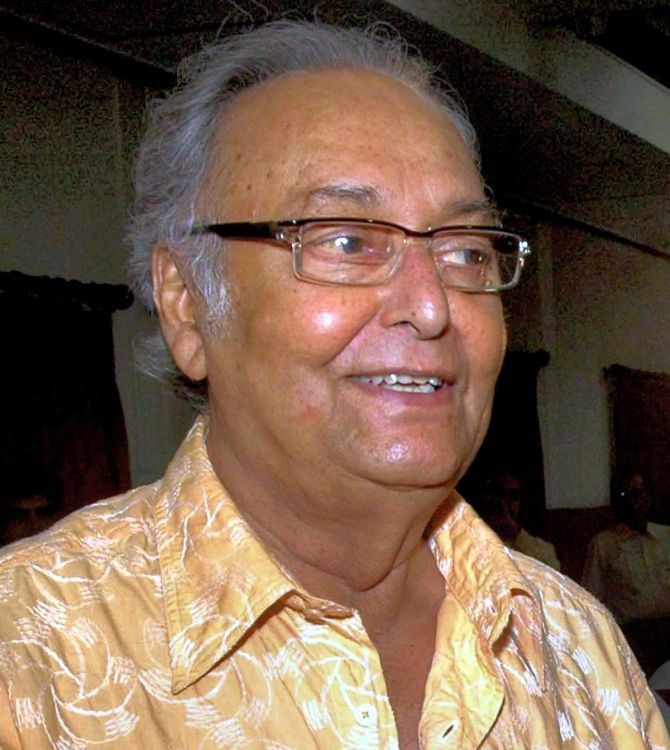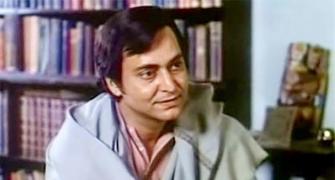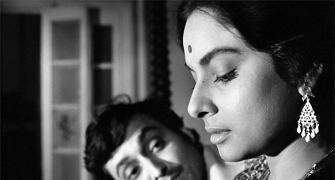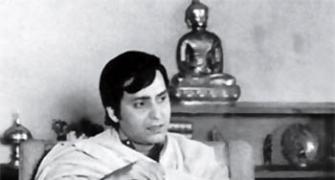In a career spanning six decades, the Dada Saheb Phalke awardee has acted in more than 300 films.

Soumitra Chatterjee, the actor who helped take Indian cinema across the seas and wrote himself a page in the book of legends with his films, including Satyajit Ray masterpieces such as Apur Sansar and Charulata, died on Sunday after a 40-day battle with post COVID ailments.
He was 85.
Chatterjee, a cultural icon of Bengal who straddled the worlds of theatre and cinema and will be remembered not just as an actor but also as a public intellectual speaking out on varied issues, is survived by his wife Deepa, daughter Poulomi and son Sougata.
"We declare with a heavy heart that Shri Soumitra Chattopadhyay breathed his last at 12:15 pm at Belle Vue Clinic today (November 15 2020). We pay our homage to his soul," Belle Vue Hospital, where was admitted on October 6, said in a statement.
He was shifted to the ICU as COVID encephalopathy set in, affecting his central nervous system and causing renal dysfunction, doctors said.
He recovered from the infection but his condition did not improve despite several plasma therapies, dialysis and tracheotomy
On November 13, he stopped responding to treatment, his doctors said. And on Sunday, a day after the country celebrated the festival of lights, one of acting world's greatest luminaries slipped away, bringing down the curtains on a golden era of Bengali cinema and leaving a void in the global cinematic universe.
President Ram Nath Kovind and Prime Minister Narendra Modi were among the many who mourned the death of the thespian, whose collaboration with Ray led to 14 cinematic gems -- among the more than 300 films he acted in a more than six-decade career.
Chatterjee, who consciously stayed away from Bollywood, also belonged to the theatre, writing 15 plays and directing 30 stage productions.
Sending his condolences to his family, the film fraternity and “millions of fans across the world”, the president said Indian cinema has lost one of its legends.
“He will be specially remembered for the Apu trilogy and other memorable performances in Satyajit Ray's masterpieces. He made immense contribution to the craft of acting," Kovind tweeted.
The prime minister described his demise as a colossal loss to the world of cinema, cultural life of West Bengal and India.
"Through his works, he came to embody Bengali sensibilities, emotions and ethos. Anguished by his demise. Condolences to his family and admirers. Om Shanti," Modi tweeted.
West Bengal chief minister Mamata Banerjee, who rushed to the hospital after the news broke, said Chatterjee was a "giant" in international, Indian and Bengali cinema.
"Feluda' is no more. Apu said goodbye. Farewell, Soumitra (Da) Chatterjee. He has been a legend in his lifetime… The film world in Bengal has been orphaned," Banerjee wrote on Twitter in homage.
She was among the thousands who bade a tearful adieu to Chatterjee, walking with her ministerial colleagues and a host of film personalities singing Rabindranath Tagore's song, “Aguner parashmoni chhoao praane (the touchstone of fire will turn us pure)” as the flower bedecked hearse carried his mortal remains to the Keorotala Crematorium where he was given a funeral with full state honours.
As news of his death spread, crowds gathered outside the hospital for a final glimpse of their much-loved 'Feluda', Ray's fictional sleuth immortalised by Chatterjee in Sonar Kella and Joi Baba Felunath.
They also gathered outside his home in Golf Greens, and lined the roads as the cortege wound its way through the city, past Tollygunge Studio where had worked for so many decades to Kolkata's cultural hub Rabindra Sadan and from there to the crematorium.
As the sun set, people lit candles in homage and the strains of Rabindra Sangeet could be heard.
Posters of the actor were held aloft.
Elsewhere in the state, people brushed aside the COVID-19 scare and took out processions with photographs of the veteran actor as a mark of respect.
The last of the greats from the golden era of Bengali cinema was best known to the world for his long collaboration with Ray that started with the actor's debut in 1959's Apur Sansar, the final film in the Apu trilogy.
The Chatterjee-Ray collaboration, one of the greatest pairings in world cinema, led to cinematic gems, including Ghare Baire, Devi and Aranyer Din Ratri. But it would be an injustice to Chatterjee's greatness to only remember him through his Ray films.
Chatterjee was also loved by other great Bengal directors of the era such as Mrinal Sen, Tapan Sinha and Tarun Majumdar.
Chatterjee's role as the swashbuckling villain Mayurbhan in Sinha's Jhinder Bondi saw him team up with the legendary Uttam Kumar.
They worked together in eight films and were known for their different approaches to cinema -- Kumar, the romantic hero of the masses, and Chatterjee the intellectual, maybe more cerebral star.
His loss was mourned by his colleagues and friends through the decades.
Sharmila Tagore, his first co-star in Apur Sansar, said he was one of her closest friends.
"I was 13 and he was 10 years elder to me when we started working in Apur Sansar. I really respected and admired him for what he stood for. He was one my oldest friends, after Tiger (her husband) and Shashi Kapoor. He has been such a loyal and fun friend," Tagore told PTI.
"But I know he will live forever in our memories because his legacy is so immense. It encompasses so much. He wasn't only an actor. He would paint, sing, was well read, had immense knowledge of theatre, he would write poetries and short stories for his grandchildren."
Film director Sandip Ray, Satyajit Ray's son, said he was an “actor par excellence”.
"Our families have bonded so well over the past 60 years. He was meticulous about everything... a perfectionist," Sandip Ray, who first met Chatterjee when he was just a young boy, said.
Aparna Sen, who also made her debut opposite Chatterjee in Ray's Teen Kanya (1961), went on to act with him in many films and directed him many years later in her 2000 movie Paromitar Ek Din, said he was family.
"I still can't believe that he is no longer with us. I had hoped till the last that a miracle would happen,” she said.
A pancreatic cancer survivor, the actor kept going even in his 80s -- in Mayurakshi (2017), Bela Sheshe (2015) and Posto (2017).
Among the last photographs of the actor to be widely circulated on social media is of him signing a petition against the Citizenship Amendment Act and the National Register of Citizens.
Chatterjee, who received several awards, including the Dadasaheb Phalke, turned down the Padma Shri twice and the National Award once.
However, he later received the Padma Bhushan in 2006.
Besides, he was the first Indian actor to receive the ”Officier des Arts et Metiers”, the highest award for arts given by the French government in 1999.
In 2018, he was awarded Légion d' honneur, the highest civilian award in France.








